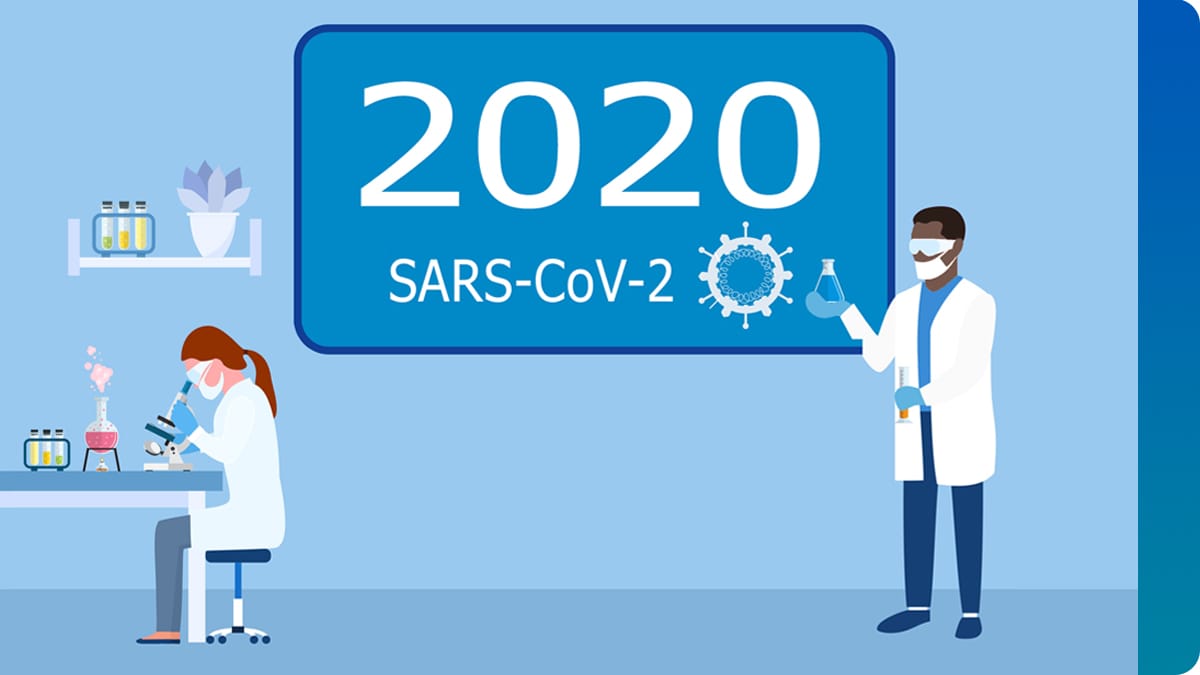What to know
This genomic epidemiologic study, from Yale and Johns Hopkins University, integrated virus evolution and human behavior on regional and national scales. Awarded in 2020, the study revealed SARS-CoV-2 genetic diversity within New England and patterns of virus spread to help assess the effectiveness of intervention strategies for containing SARS-CoV-2. Along with providing additional monitoring, this study informed future decision-making and created a new roadmap for responding to pandemic threats.

Findings on SARS-CoV-2 surveillance and investigations
This project:
- Determined that the Mu Variant of Concern had limited global transmission despite decreased neutralization by antibodies.1
- Evaluated the impact of disparities in SARS-CoV-2 surveillance efforts globally on the detection of known lineages and variants of concern.2
- Demonstrated, via SARS-CoV-2 sequencing data, that overall monitoring trends found through wastewater surveillance correspond to those detected from clinical samples.3
- Demonstrated that through molecular testing the failure of a specific genomic region to be amplified could be used to track a particular Omicron sub-variant of SARS-CoV-2.4
- Compared the dynamics of SARS-CoV-2 variants and the transmissibility of variants circulating at the same time. 5
- Demonstrated sequence data derived from saliva samples is comparable to sequence data from nasal swabs.6
- Identified a deletion common to three variants of concern and developed an open-source PCR assay to enhance global surveillance for those variants.7
- Determined New York, California, and Florida were primary ports of entry of SARS-CoV-2 variant B.1.1.7 using travel, genomic, and diagnostic data, and described spread of this variant to neighboring states.8
- Described the emergence of variants such as B.1.1.7, public health strategies for SARS-CoV-2 surveillance, and measures to reduce community transmission.9
Findings on SARS-CoV-2 variant characteristics
This project:
- Determined that the rapid rise in Omicron infections was likely driven by Omicron's escape from vaccine-induced immunity.10
- Investigated comparative dynamics of the SARS-CoV-2 Delta and Alpha variants in the New England area. Researchers worked with collaborators at the Broad Institute of MIT and Harvard, which is also supported through a BAA.11
- Used sequencing to determine SARS-CoV-2 lineage in a vaccine effectiveness study among adolescents.12
- Contributed sequencing data that revealed infection with two distinct lineages of SARS-CoV-2 during primary infection and reinfection in a solid organ transplant recipient.13
- Used whole genome sequencing to confirm an outbreak of SARS-CoV-2 among immunocompromised patients in a hospital transplant unit.14
- Determined there were multiple lineages of SARS-CoV-2 among veterans in six New England States during the early phase of the COVID-19 pandemic.15
- Insights into the limited global spread of the immune evasive SARS-CoV-2 variant Mu, medRxiv, 2022.
- Global disparities in SARS-CoV-2 genomic surveillance, medRxiv, 2021.
- Variant abundance estimation for SARS-CoV-2 in wastewater using RNA-Seq quantification, medRxiv, 2021.
- Partial ORF1ab Gene Target Failure with Omicron BA.2.12.1, Journal of Clinical Microbiology, 2022.
- Combining genomic and epidemiological data to compare the transmissibility of SARS-CoV-2 variants Alpha and Iota, Communications Biology, 2022
- Sequencing SARS-CoV-2 genomes from saliva, Virus Evolution, 2022.
- Multiplex qPCR discriminates variants of concern to enhance global surveillance of SARS-CoV-2, PLoS Biology, 2021.
- Early introductions and transmission of SARS-CoV-2 variant B.1.1.7 in the United States, Cell, 2021.
- Public health actions to control new SARS-CoV-2 variants, Cell, 2021.
- Rapid emergence of SARS-CoV-2 Omicron variant is associated with an infection advantage over Delta in vaccinated persons. Med(N.Y), 2022.
- Comparative transmissibility of SARS-CoV-2 variants Delta and Alpha in New England, USA. Cell Reports Medicine, 2022.
- Assessment of Clinical Effectiveness of BNT162b2 COVID-19 Vaccine in US Adolescents. JAMA Network Open, 2022.
- Longitudinal immune profiling of a SARS-CoV-2 reinfection in a solid organ transplant recipient. Res Sq, 2021.
- An outbreak of SARS-CoV-2 on a transplant unit in the early vaccination era. Transplant Infectious Disease, 2021.
- COVID-19 Outcomes and Genomic characterization of SARS-CoV-2 isolated from Veterans in New England States: Retrospective Analysis. JMIRx Med, 2021.
